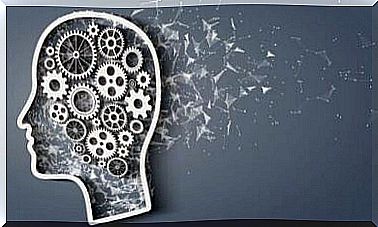Mental Dispersion: Take Advantage Of It

You may have already heard the following sentences: “you are very distracted”, “you are on a thousand things at once but, in fact, you are not doing any” or “you are in the moon” … But what? is mental dispersion? Is it a negative thing or does it have positive aspects? What can we do so that mental dispersion does not interfere in a negative way in our daily life?
In this article, we will discover what this concept related to the mind and cognition consists of, by analyzing the posture of the greatest psychologists in this field. We will also see how it relates to intelligence and, more concretely, to Howard Gardner’s theory of multiple intelligences. So stay with us!
Mental dispersion: what is it?
Mental dispersion consists of trying to tackle, in a natural way, several points at the same time ; a multiplicity of demanding stimuli that would overflow our attentional resources, affecting capacities as important as working memory.
What does it translate to? If any of these requests is a problem, we may end up solving it badly or not solving it at all.

Gardner’s theory of multiple intelligences
We can relate the concept of mental dispersion to the theory of multiple intelligences of Howard Gardner (1983). How ? Let’s go back to its point of origin …
Howard Gardner, a psychologist, researcher and professor at Harvard University, is perhaps the best-known representative of the idea that there are different types of intelligence. A thought that faces a much more reductive social conception of this basic psychological process.
Gardner argues that we have many forms and areas where we can be smart; he thus established up to 8 types of intelligence. In this way, he began to categorize other forms of thought through his theory of multiple intelligences (1983).
Some of these “new” intelligences have the risk of mental dispersion; in other words, people who do not have a very strong analytical intelligence (the “classic” intelligence), who are not so attentive, would be more likely to disperse.
In this context, mental dispersion would be extremely associated with the risk that people with more creative and intuitive intelligence have of not being able to focus their attention.
Problems and Benefits of Mental Dispersion
The problem with mental dispersal is that, in the end, you don’t solve anything: you let things fade away, and that’s it. All of this causes that there is a kind of energy leak, which makes us feel exhausted and prevents us from achieving things.
However, when mental dispersal is not extreme, it can be adaptive; this is linked to creativity and intuition. According to coach Mónica González, the great advantages implied by other intelligences more marked than the “classic” (musical, kinesthetic, artistic …) prevent you from being concentrated or focusing your attention on one point: it is mental dispersion.
Even though this concept sounds negative, it is not at all. Indeed, when you are able to integrate many different concepts, in reality, you create a whole enriched, diverse and plural.
How to work on mental dispersion?
According to Mónica González, it is important to ask the person whether this mental dispersion, which is intrinsic to his nature, creates problems for him or not. In other words, ask him: does mental dispersal make you feel bad? Do you have a gap to fill or change? If the scatter interferes and the person wants to change that, then we can put the following in place:
- Using lists and calendars, for the things we want to do and perform (actions). For example, through Google Calendar or various apps reserved for organizing time.
- Create routines and habits. It’s easy for our minds to get scattered, even with habits and routines, but that’s okay. The problem is not being able to bring our mind back to where we want it to be, focusing our attention. Fortunately, this is done through attention control.
- Take breaks that allow our mind to travel. Often times, we force ourselves to complete a task for many hours, staying focused, and that is not possible. We have to leave space for ourselves so that our mind can go where it wants to go; and when the break ends, we will need to focus our attention on our task again.
For his part, psychologist Luis Miño suggests the following rules when working on mental dispersion:
Channel attention, energy and thought
Miño recommends not to see mental dispersion as a negative thing and to try to be “friends” with it, because it is associated with good things: creativity, intuition… But what does it mean to channel all these elements?
On the one hand, give yourself space for dispersal because our brains need it (don’t try to force your attention all day) and, on the other hand, learn to come down to the “real world” when it does. is necessary.
How? ‘Or’ What ? By separating the mental world from the real world. You can do this by establishing gestures, such as flicking the table or pinching your watch. This will allow you to come back to real life and focus your attention where you want it to be. It is about automating these returns to reality, through these small actions.
Take advantage of this mental dispersion
Miño also recommends taking advantage of this mental dispersion, giving it its territory in time and space. In other words, it would not be a question of avoiding dispersion but of profiting from it and drawing lessons from it, by channeling it; assume it and accept it as part of our vital moments and not attack it.
A diffuse thought which jumps very quickly from one concept to another, from one domain to another, is sometimes able to establish associations which are really innovative.

Take care of our sleeping habits
It is also important to ensure our sleep. According to experts, sleeping and dreaming are ways to dismiss leftover thoughts that are no longer useful to our mind. This is why it is essential that people with a tendency to mental dispersion ensure this habit.
A good rest improves our attentional capacity. Thus, thanks to a good sleep, we will be able to focus our attention for a longer time and reap more fruit when it is dispersed.










